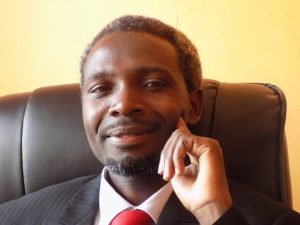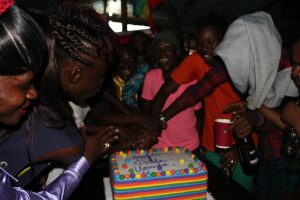Spectrum’s Moses Kimbugwe Speaks Out on the Journey of the Ugandan LGBTI Movement Thus Far, what Fuels his Political Ambitions and the Need for more Protective Laws
By Editor
Moses Kimbugwe Mulindwa is a social worker, human rights defender, gay activist and a farmer. He went to Gayaza Primary School for his early primary education; he then moved to Nalabaye Day and Boarding Primary for primary four five and six before joining Nakivubo Blue Primary where he sat for his Primary Leavers Examination.
He joined Gombe secondary for O level and sat for his UACE exams at Makerere High School. After his formal higher education, he went on Makerere University where he studies Social Works and Administration, a course that shaped his career ambitions.
Like many kuchus in Uganda, Moses stayed in the closet until he had completed his education. This decision was based on the fear of being thrown oyut of both home and school. After acquiring his degree, Moses worked as a station manager at Caltex Bwaise where he stayed for about one and a half years.
It was during this time that he interacted with several gay boys and for the first time, was evenly faced with the challenges faced by the LGBTI community in the country. Soon, his bosses found out about his friendliness with these boys and fired him. The year was 2005.
Out of a job, Moses started pondering what he would do to make an impact in the then young movement. While at a gay friendly bar, fate brought one of the leading gay activists, Samuel Ganafa, his way. The two talked and by the end of their discussion, Moses had made up his mind he would join the movement and actively fight discrimination toward LGBTI people.
In 2006, Ganafa introduced him to other activists Victor Mukasa, Pastor Brown and the Late David Kato. They resolved that Moses could come on board as a volunteer for Spectrum Uganda. He worked as a volunteer till 2008 when he was promoted to the organization’s Public Relations Office. In 2011, Moses was moved to the Programming section, an office he still holds to date.
After coming out, Moses says he lost most of his friends and some of his family members shunned him. He however maintained as normal a relationship as he could with his family and today, most have come around and while they do not understand his sexual orientation, they have realized it has not made him any less of a human being.
With a dream to become a Member of Parliament, Moses wants to use this political platform to raise awareness for the movement and says it would be a way to easily table the issues affecting the LGBTI community.
Kuchu Times caught up with the fearless Moses and he shared his thoughts on the LGBTI movement in Uganda and Spectrum’s vision for sexual minorities.
KT: What is Spectrum all about?
MK: Spectrum Uganda started; initially it was a safe place where LGBTI people would meet up and openly talk about the issues affecting them in all spheres of their lives. In December 2004, it was anonymously decided for Spectrum to be registered an NGO focusing on social and health rights of sexual minorities, poverty as well as suicide within the same community. Overtime, Spectrum has now grown to centre on MSM (men who have sex with men) and transgenders.
This is because many organisations have been set up overtime and there was a need to specialize on a certain group of people.
Spectrum basically deals with health issues that affect the above groups and advocacy where we analyse laws and how they affect the health service delivery in the community.
KT: What are some of the pressing issues affecting the LGBTI community?
MK: The most pressing issue within the LGBTI community is poverty. First of all, this is something that is affecting the nation as a whole but to be in situation where you are stigmatised and discriminated only worsens the state of matters.
LGBTI people are not easily employed, cannot easily access health care, and are continuously thrown out of schools; hence abusing their basic rights as human beings. How can we fight poverty if we don’t have an education and can’t find employment?
The laws that criminalise people based on their sexual orientation are also hindering the movement from growing. For example after the ‘Kill the Gays’ law was tabled, most people went back into the closet for fear of their lives.
The community is also faced with the problem of HIV. We had made quite headway in this area with the sensitization programmes we had set up; wed were also providing protection material like condoms and lubricants as well as health services. When the bill became a threat to people’s lives, many stopped attending these programmes and without the protection material, the infection rates have surged up again.
KT: What would you say are some of the strengths of the movement?
MK: The greatest achievement for the community I’d say is the fact that most organisations have been professionalized. It has helped in the running of day today activities and coordination within the movement.
There is also unity within this community, that is undeniable but we must also realize that the LGBTI movement has unified with other human rights organisations as a whole. We have partnered with ministries and other concerned parties, something that could not be said ten years ago.
Also, there is open debate about gay issues in the country. Most of these might not be positive but the fact that people are talking about it is a good sign and shows that people are not so closed up anymore.
KT: Where do you see the movement in ten years’ time?
MK: The movement is moving in the right direction and in about ten years’ I think the laws would have greatly changed and the LGBTI community will feel much safer. We might even be at a point where same sex marriages are not shunned upon anymore.
KT: Most people especially Ugandans think this movement is all about getting the country to embrace homosexuality, what are your comments on this notion?
MK: First of all this is about human rights and the LGBTI community is fighting for protection. We simply want the laws to protect our rights and our people to live normal lives, not in fear as they currently are. Being protected and being accepted are two different issues. We will not be accepted if the law does not protect us!
KT: You were part of the team that distributed the Bombastic Magazine, tell us about the experience and fears.
MK: The distribution of Bombastic magazine was a rollercoaster. People were scared for their lives and in some places, we got a negative reception. But we were also pleasantly surprised by some top leaders, for example the Police PRO Polly Namaye who asked us to bring in more copies.
The idea of reclaiming the media was groundbreaking for us because media houses in the country have not been fair to us , religious and political leaders have also fueled the hate towards the movement. It was great having the people in the community tell their own stories and share their perspectives with the world.




